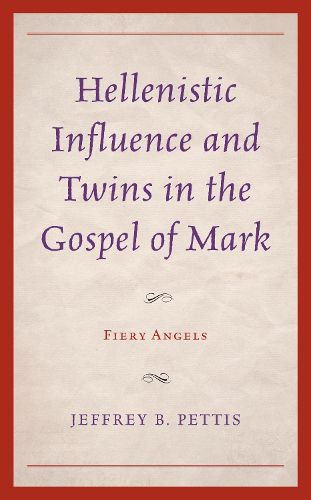Readings Newsletter
Become a Readings Member to make your shopping experience even easier.
Sign in or sign up for free!
You’re not far away from qualifying for FREE standard shipping within Australia
You’ve qualified for FREE standard shipping within Australia
The cart is loading…






Hellenistic Influence and Twins in the Gospel of Mark: Fiery Angels examines the influence of Hellenistic culture in the Gospel of Mark. It focuses upon Jesus' twin disciples James and John. Jesus gives them the name Boanerges, "Sons of Zeus" referring to the Dioscuri, mythological figures known for their saving action in times of human danger and distress. This book addresses various questions prompted by Jesus' naming of James and John. Is the author embracing Hellenistic myth and mythology as part of his story? Does he portray Jesus as one who himself is influenced by Hellenistic culture, and if so, to what extent? To gain insight into these questions, Jeffrey B. Pettis examines various sources-dioscuric figures in Second Maccabees 3, three visitors in Genesis 18-19, traces of dioscurism in the Markan boat stories. Major themes include fire and sacrifice, theophany, personal saviors, and old and new religion. Of particular interest is the extent to which myth and mythology grasp the hearer's attention and occur as something which makes an impression. Does the author of Mark make use of myth for just this reason-to capture attention and to make and awaken his community to a larger world?
$9.00 standard shipping within Australia
FREE standard shipping within Australia for orders over $100.00
Express & International shipping calculated at checkout
Hellenistic Influence and Twins in the Gospel of Mark: Fiery Angels examines the influence of Hellenistic culture in the Gospel of Mark. It focuses upon Jesus' twin disciples James and John. Jesus gives them the name Boanerges, "Sons of Zeus" referring to the Dioscuri, mythological figures known for their saving action in times of human danger and distress. This book addresses various questions prompted by Jesus' naming of James and John. Is the author embracing Hellenistic myth and mythology as part of his story? Does he portray Jesus as one who himself is influenced by Hellenistic culture, and if so, to what extent? To gain insight into these questions, Jeffrey B. Pettis examines various sources-dioscuric figures in Second Maccabees 3, three visitors in Genesis 18-19, traces of dioscurism in the Markan boat stories. Major themes include fire and sacrifice, theophany, personal saviors, and old and new religion. Of particular interest is the extent to which myth and mythology grasp the hearer's attention and occur as something which makes an impression. Does the author of Mark make use of myth for just this reason-to capture attention and to make and awaken his community to a larger world?